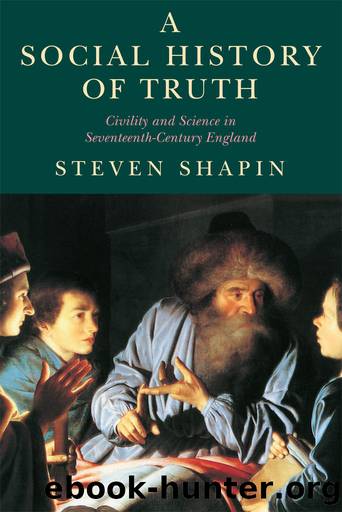A Social History of Truth (Science and Its Conceptual Foundations series) by Steven Shapin

Author:Steven Shapin [Shapin, Steven]
Language: eng
Format: epub
Publisher: University of Chicago Press
Published: 2011-11-18T08:00:00+00:00
CHAPTER SEVEN
Certainty and Civility: Mathematics and Boyleâs Experimental Conversation
What scientists seek in numerical tables is not usually âagreementâ at all, but what they often call âreasonable agreement.â
Furthermore, if we now ask for a criterion of âreasonable agreement,â we are literally forced to look in the tables themselves.
âT. S. Kuhn, âFunction of Measurementâ
When we assess the truth of a claim to factual knowledge, we typically take a view on whether or not it is a representation that corresponds to the world. That assessment embeds some notion of adequate precision: How exact is that correspondence supposed to be? How much variation is to be expected in independent reports about âthe sameâ reality beyond which we conclude that they do not reliably report upon the same world at all or that one or the other is untrue? That is to say, a decision that a representation is trueâthat it corresponds to realityâincorporates some notion of legitimate variation. Sometimes practitioners produce reflective accounts of the nature and source of variation, but always they have practical ways of identifying and managing it. As Kuhn has argued, in order to say that experimental results âfitâ or âconfirmâ a hypothesis, one has to implement some procedure for identifying when fit is good enough. One could, of course, endeavor explicitly to formulate a rule for âgood enough fitting,â only to find oneself in need of a further rule to determine how the fitting rule ought to be applied. In practice, as the epigraph to this chapter indicates, adequate fit is characterized through its instantiation by a relevant community of reasonable people.1
I want here to argue that practical decisions about precision and variation in factual reports are moral judgments and that they too have a social history. They are, of course, judgments about what the world is like such that this range of reports accurately corresponds to it.2 But they are also judgments about the probity and skill of the practitioners who produce these reports, and, accordingly, they embed norms about the degree of exactness and certainty it is right to expect of competent and sincere human reports. How do we recognize trustworthy testimony about the world? What accuracy and certainty ought we to demand of each other? With what confidence ought we to advance our claims about the world? What warrant ought those claims to have? Precision judgments, consequently, always have a normative character. They are consequential decisions about the moral economy of those who testify about nature.
The case I want to work through is central to the probabilistic, observational and experimental English tradition which has been the focus of this book. It concerns Robert Boyleâs view of the proper place of mathematics, and the proper expectation of mathematical exactness and certainty, within the practice of experimental natural philosophy. Like many other English and Continental natural philosophers of the seventeenth century, Boyle clearly identified mathematical techniques as valuable resources in securing and representing natural knowledge. Galileo famously claimed that the Book of Nature was âwritten in the language
Download
This site does not store any files on its server. We only index and link to content provided by other sites. Please contact the content providers to delete copyright contents if any and email us, we'll remove relevant links or contents immediately.
| Automotive | Engineering |
| Transportation |
Machine Learning at Scale with H2O by Gregory Keys | David Whiting(4313)
Never by Ken Follett(3957)
Urban Outlaw by Magnus Walker(3397)
OPNsense Beginner to Professional by Julio Cesar Bueno de Camargo(3288)
Sapiens and Homo Deus by Yuval Noah Harari(3071)
Will by Will Smith(2920)
A Short History of Nearly Everything by Bryson Bill(2698)
Hooked: A Dark, Contemporary Romance (Never After Series) by Emily McIntire(2555)
Rationality by Steven Pinker(2366)
Borders by unknow(2315)
The Becoming by Nora Roberts(2203)
Holy Bible (NIV) by Zondervan(2125)
A Short History of War by Jeremy Black(1848)
HBR's 10 Must Reads 2022 by Harvard Business Review(1845)
The One Percenter Encyclopedia by Bill Hayes(1827)
Freedom by Sonny Barger(1801)
Go Tell the Bees That I Am Gone by Diana Gabaldon(1758)
A Game of Thrones (The Illustrated Edition) by George R. R. Martin(1746)
Five Ways to Fall by K.A. Tucker(1744)
